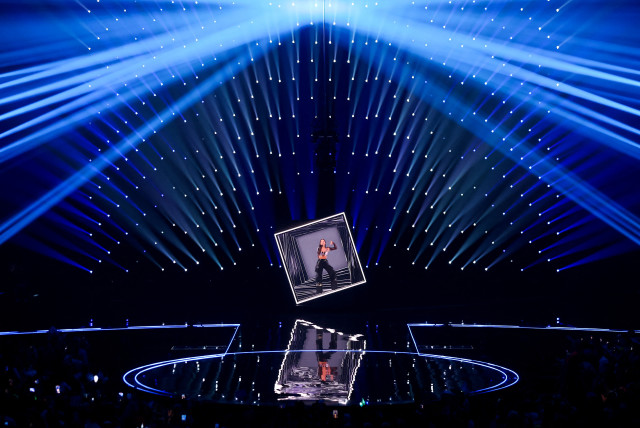'Hurricane' headed to Eurovision, as Israel releases entry video for song competition

As Israel faced a rocky path to the 2024 Eurovision in Sweden, facing issues in song approval, Israeli public broadcast Kan 11 revealed the video for Eden Golan's "Hurricane."
Israel’s rocky road to Eurovision 2024 has been swept away by a “Hurricane” – which is the title of Israel’s official song submission, the video for which was revealed in a broadcast on Kan 11 on Sunday night, performed by Eden Golan, this year’s contestant.
עדן גולן - הוריקן Eden Golan - Hurricane | Official Israeli entry | Eurovision Song Contest 2024 pic.twitter.com/gQ6JH5HPNY
— כאן (@kann) March 10, 2024
Golan will sing “Hurricane” at Eurovision in Malmo, Sweden in May.
In the “Hurricane” video, she sings on various stages, with groups of dancers, and in a field, which clearly references the murders committed by Hamas at the Supernova Music Festival in Re’im. Sunday night’s broadcast also presented a video in which Golan sang alongside Noa Kirel, last year’s Israeli Eurovision representative, in a new video of the song Kirel sang in Eurovision last year, “Unicorn.”
Israel's path to the 2024 Eurovision
It hasn’t been easy to get Israel’s song choice approved this year, but “Hurricane” just received the thumbs-up from the European Broadcasting Union (EBU), which runs the annual contest. Israel’s first song submission, “October Rain,” was rejected because its lyrics were deemed too political, a violation of the EBU’s rules. They obviously referred to the Hamas massacre of 1,200 Israelis and foreigners in Israel, which started the current war. There have been many calls for Israel to be banned from Eurovision – there are always such calls, but this year, they have intensified, due to the war – but the EBU has remained steadfast in its assertion that Israel will not be banned, saying it is a contest for broadcasters, not governments, and that Israel’s state broadcaster, Kan, has not violated EBU rules. Russia’s broadcaster did violate these rules, according to the EBU, and has been excluded from participating in Eurovision since it began its invasion of Ukraine.
For a little while, it looked as if Israel’s Eurovision organizers would not make the requested changes and it seemed possible that Israel might not take part in Eurovision this year, a situation that the Eurovision-loving Israeli public couldn’t accept. No less an authority than President Isaac Herzog urged a change in the lyrics and the song was rewritten and given its new title. The Hebrew lyrics now come at the end of the song and now say, "No need for big words, only prayers, even if it's hard to see you always leave me one small light."
Lyrics touching upon national pain
Previously, the text had more explicitly referenced those killed by Hamas in the October 7 massacre: "There's no air left to breathe, no place, no me, from day to day, they're all good kids, each one of them."
It's still a song about loss and redemption, but couched in more poetic, less specific terms.
The English lyrics now go:
Symphony, playing with me,
Look into my eyes and see
People walk away but never say goodbye
Someone stole the moon tonight,
Took my light,
Everything is black and white
Who's the fool who told you boys don't cry?
Hours and hours and powers
Life is no game but it's happen
While the time goes by...
Every day I’m losing my mind
Holding on in this mysterious ride
Dancing in the storm, i got nothing to hide
Take it out and leave the world behind
Baby, promise me you hold me again
I'm still broken from this hurricane,
This hurricane
Eurovision has held an important place in Israel’s cultural landscape for over 50 years because it was one of the first international arenas in which Israel excelled.
Eurovision was started in the wake of World War II to encourage peaceful competition among nations and has blossomed into a glittery extravaganza, with millions around the world watching it on television and voting for the winner. Israel began taking part in Eurovision in 1973, since it would not have been welcomed in a Middle Eastern regional song contest. It took home the top prize in 1978 and 1979 with wins for Izhar Cohen and the Alphabeta for the song “A-Ba-Ni-Bi” and Milk and Honey for “Hallelujah,” respectively, and again in 1998 with Dana International’s “Diva.”
Israel's storied past with Eurovision
While for decades the top prize eluded Israel, Israelis continued to be devoted Eurovision fans, cheering on Israeli contestants. Finally, in 2018, Netta Barzilai became Israel’s fourth Eurovision winner with her rousing rendition of “Toy,” a self-empowerment anthem.
Last year, Noa Kirel, Israel’s contestant, came in third with her high-energy song, “Unicorn,” and a video of her performance at the finals has received more than 12 million views.
Prior to the release of the “Hurricane” video, the Eurovision World betting table, which compile odds from around the world, placed Israel in eighth place, out of 37 countries.
A sad footnote to this year’s competition was the death of one of The Next Star contestants, Shaul Greenglick, who appeared on the show in early December, and was killed not long afterwards in the fighting in the Gaza Strip. Greenglick, 26, from Ra’anana, an officer in the Nahal Brigade’s 931st Battalion, wore his uniform to perform and sang the song “Blind Bat” by Hanan Ben Ari. The judges were enthusiastic about his performance, and he would have advanced to the next round.
Jerusalem Post Store
`; document.getElementById("linkPremium").innerHTML = cont; var divWithLink = document.getElementById("premium-link"); if (divWithLink !== null && divWithLink !== 'undefined') { divWithLink.style.border = "solid 1px #cb0f3e"; divWithLink.style.textAlign = "center"; divWithLink.style.marginBottom = "15px"; divWithLink.style.marginTop = "15px"; divWithLink.style.width = "100%"; divWithLink.style.backgroundColor = "#122952"; divWithLink.style.color = "#ffffff"; divWithLink.style.lineHeight = "1.5"; } } (function (v, i) { });

